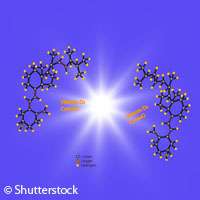Scientists develop blood test for vitamin D deficiency

Weakening of the immune system is the result of not enough vitamin D coursing through the human body, potentially raising the risk of cancer and osteoporosis. But a British team of scientists has created a novel, super accurate blood test with the capacity to determine just how big a role a person's diet plays in vitamin D deficiency. The test is presented in two papers of the Nutrition Journal.
After evaluating data retrieved from 20 years of research, researchers discovered that a clear link between vitamin D deficiency and health and disorders was missing. Enter the test...
Led by Professor Declan Naughton, the Kingston University London researchers developed the test over a five-month period, discovering how it is possible to distinguish various forms of vitamin D the body absorbs from diet and sunlight (i.e. vitamin D12 and vitamin D3) from closely related compounds.
'Many people know that the main source of vitamin D is from exposure to sunlight because humans produce a type of vitamin D naturally from the action of sun on the skin,' says senior author of the study, Professor Naughton from Kingston's Department of Life Sciences. 'But what's perhaps less well known is that another type of the vitamin can be found in foods such as salmon, mackerel, sardines and egg yolks. Our new test can individually measure all the forms of vitamin D that matter, and potentially help us to understand exactly what is causing any deficiency. Perhaps people just need more sun, or maybe they should be looking much more closely at their diet too.'
People in the western world continue to deal with vitamin D deficiency. Recent studies have shown that between 40 % and 100 % of older people in Europe and the United States are not getting the right amount of vitamin D into their bodies.
Vitamin D deficiency is marked by aching muscles and bones, and fatigue; people with severe deficiency can also suffer from osteoporosis. Patients in the United Kingdom are now being injected with vitamin D to increase their levels.
Experts say this sophisticated blood test could help researchers show how a lack of vitamin D affects the body, increasing people's chances of suffering from various diseases including diabetes.
Our teeth and bones get the help they need from vitamin D, but Professor Angus Dalgleish at St George's Hospital in London points out that vitamin D is not only crucial for the formation of bone and teeth. This important vitamin also helps ensure the normal function of most tissues, 'particularly blood vessels and the immune system.'
Commenting on how significant it is to have a test that can gauge the levels of vitamin D accurately, leading cancer expert Professor Dalgleish says: 'It's crucial to have a normal vitamin D level and that is becoming increasingly apparent across a broad range of diseases, including cardiovascular, neurological and cancer cases. It is therefore very important to be able to accurately and reliably measure the different forms of vitamin D in order to monitor levels and to make sure they are maintained in the normal range.'
More information:
Shaf, I., et al. (2011) Nutrition Journal. DOI: 10.1186/1475-2891-10-46
Zhang, R., & Naughton, D. (2011) Vitamin D in health and disease: Current perspectives. Nutrition Journal. DOI:10.1186/1475-2891-9-65














